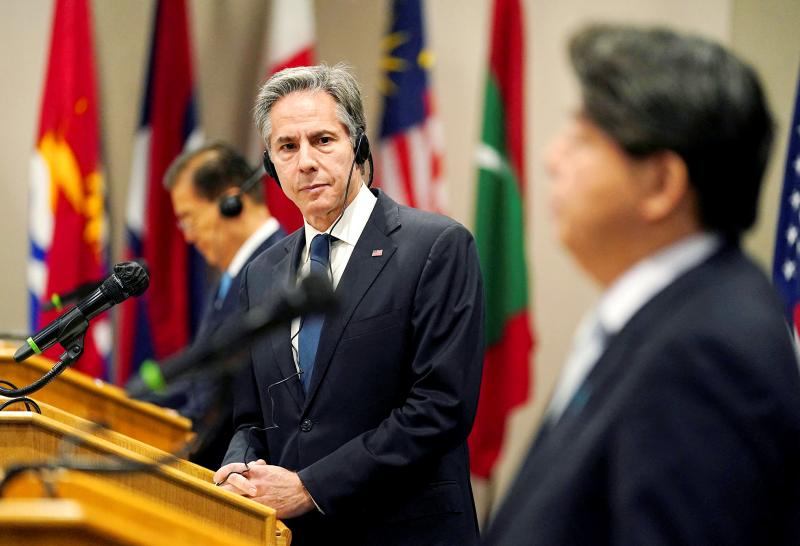US Secretary of State Antony Blinken and foreign ministers from Japan and South Korea on Saturday committed to work together to deter further Russian escalation along Ukraine’s border, and condemned North Korea’s recent ballistic missile launches.
Blinken and his counterparts also underscored the importance of maintaining stability in the Taiwan Strait.
Blinken, Japanese Minister of Foreign Affairs Yoshimasa Hayashi and South Korean Minister of Foreign Affairs Chung Eui-yong stressed the “critical importance” of strong cooperation among their countries for regional stability, they said in a joint statement after wide-ranging talks in Hawaii.

Photo: Reuters
The officials discussed the Russian military buildup along Ukraine’s borders and their “unwavering support for Ukraine’s sovereignty and territorial integrity,” the statement said.
The US Department of State has ordered “non-emergency US employees” to depart the embassy in Ukraine’s capital, Kiev, and suspended consular services there.
Russia has repeatedly rejected charges it plans to invade Ukraine, accusing NATO of threatening its security by considering Ukrainian membership in the military alliance.
On North Korea, the three officials “expressed deep concern about the destabilizing nature” of Pyongyang’s recent ballistic missile launches, calling on it to cease unlawful activities and engage in dialogue.
“It is clear to all of us that the DPRK [Democratic People’s Republic of Korea] is in a phase of provocation,” Blinken told a joint news conference after the meetings.
The US, Japan and South Korea are working closely to “achieve complete denuclearization and lasting peace on the Korean Peninsula,” remain open to dialogue and are prepared to meet with North Korea without preconditions, the statement said.
They pledged to “intensify efforts” to end violence in Myanmar and supported efforts by ASEAN to resolve the country’s crisis.
The talks also focused on common approaches to address priorities such as the climate crisis, supply chains and global health security, including efforts to put an end to the COVID-19 pandemic.

A magnitude 7.0 earthquake struck off Yilan at 11:05pm yesterday, the Central Weather Administration (CWA) said. The epicenter was located at sea, about 32.3km east of Yilan County Hall, at a depth of 72.8km, CWA data showed There were no immediate reports of damage. The intensity of the quake, which gauges the actual effect of a seismic event, measured 4 in Yilan County area on Taiwan’s seven-tier intensity scale, the data showed. It measured 4 in other parts of eastern, northern and central Taiwan as well as Tainan, and 3 in Kaohsiung and Pingtung County, and 2 in Lienchiang and Penghu counties and 1

FOREIGN INTERFERENCE: Beijing would likely intensify public opinion warfare in next year’s local elections to prevent Lai from getting re-elected, the ‘Yomiuri Shimbun’ said Internal documents from a Chinese artificial intelligence (AI) company indicated that China has been using the technology to intervene in foreign elections, including propaganda targeting Taiwan’s local elections next year and presidential elections in 2028, a Japanese newspaper reported yesterday. The Institute of National Security of Vanderbilt University obtained nearly 400 pages of documents from GoLaxy, a company with ties to the Chinese government, and found evidence that it had apparently deployed sophisticated, AI-driven propaganda campaigns in Hong Kong and Taiwan to shape public opinion, the Yomiuri Shimbun reported. GoLaxy provides insights, situation analysis and public opinion-shaping technology by conducting network surveillance

‘POLITICAL GAME’: DPP lawmakers said the motion would not meet the legislative threshold needed, and accused the KMT and the TPP of trivializing the Constitution The Legislative Yuan yesterday approved a motion to initiate impeachment proceedings against President William Lai (賴清德), saying he had undermined Taiwan’s constitutional order and democracy. The motion was approved 61-50 by lawmakers from the main opposition Chinese Nationalist Party (KMT) and the smaller Taiwan People’s Party (TPP), who together hold a legislative majority. Under the motion, a roll call vote for impeachment would be held on May 19 next year, after various hearings are held and Lai is given the chance to defend himself. The move came after Lai on Monday last week did not promulgate an amendment passed by the legislature that

AFTERMATH: The Taipei City Government said it received 39 minor incident reports including gas leaks, water leaks and outages, and a damaged traffic signal A magnitude 7.0 earthquake struck off Taiwan’s northeastern coast late on Saturday, producing only two major aftershocks as of yesterday noon, the Central Weather Administration (CWA) said. The limited aftershocks contrast with last year’s major earthquake in Hualien County, as Saturday’s earthquake occurred at a greater depth in a subduction zone. Saturday’s earthquake struck at 11:05pm, with its hypocenter about 32.3km east of Yilan County Hall, at a depth of 72.8km. Shaking was felt in 17 administrative regions north of Tainan and in eastern Taiwan, reaching intensity level 4 on Taiwan’s seven-tier seismic scale, the CWA said. In Hualien, the